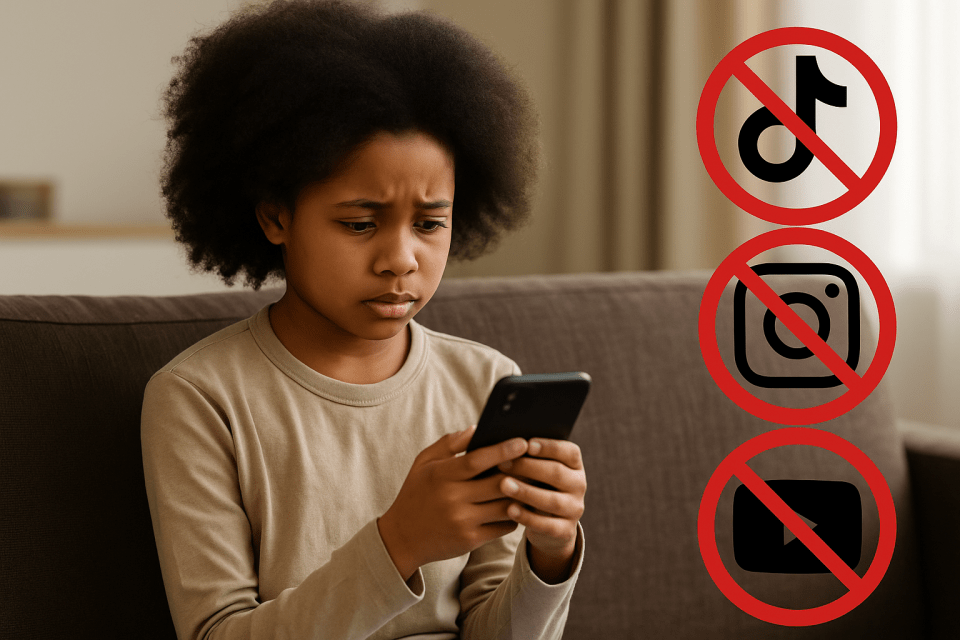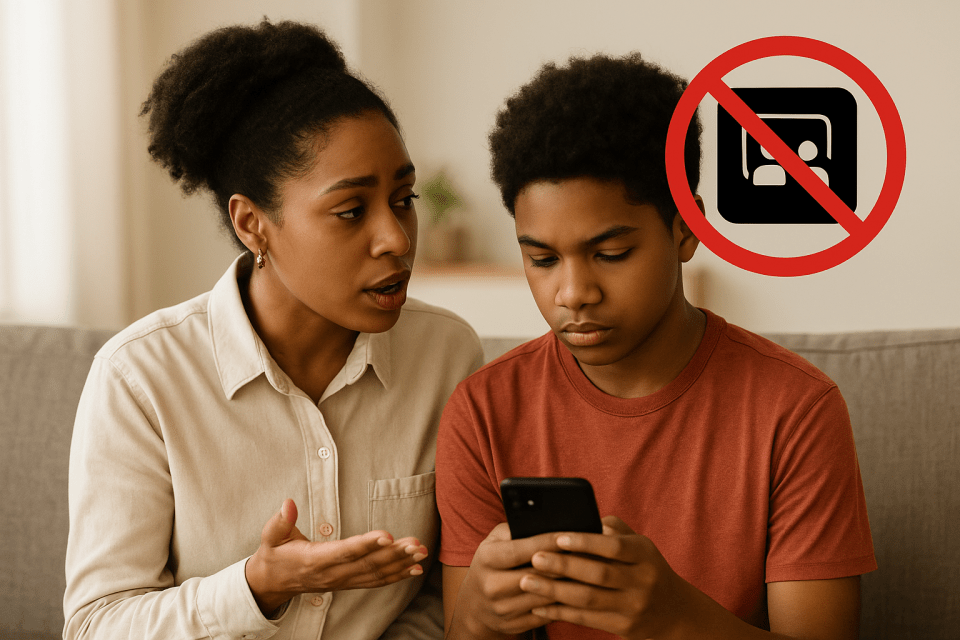6-minute read
Social media is about to change in a way that directly impacts our children. Lawmakers are introducing new age restrictions and outright bans for kids and teens across platforms like TikTok, Instagram, and YouTube. While these rules are meant to protect young people from harmful online experiences, they will also dramatically shift how Black children and teens connect with their peers and culture.
For Black parents, this moment is more than just about screen time. It is about protecting identity, culture, and community in a world where digital spaces have become essential for our children’s voices.

“According to Pew Research, Black youth are highly active online, often spending more time on social media than their peers.”
Why the Social Media Ban for Children Matters for Black Families
According to Pew Research, Black youth are highly active online, often spending more time on social media than their peers. Platforms like TikTok and YouTube are not just entertainment. They can be lifelines.
From viral dances to activism, from celebrating natural hair to standing against racism, social media has become the stage where Black culture thrives and where Black youth feel seen and heard. When offline environments don’t always affirm their worth, online spaces provide connection, inspiration, and solidarity.
That is why this social media ban feels different for Black families. It is not simply about pulling kids away from apps. It is about preparing them for what could feel like a loss of community.
What the Ban Looks Like
The proposed bans vary, but here is what parents need to know:
- Age Restrictions: Many platforms are considering limiting access to users under 16, and in some cases, under 18.
- Parental Consent: Some laws will require verified parental consent before a teen can create or maintain an account.
- Time Limits: States are testing policies that limit how many hours a child can spend online.
- Platform Accountability: Companies may be required to block accounts belonging to underage users.
This means that the social media landscape your child knows today could look completely different within the next year.
When Will the Social Media Ban Take Effect?
The timeline for these bans depends on where you live. Some states, like Utah and Arkansas, have already passed laws restricting social media access for children under 18, set to take effect in 2025. Other states are drafting similar bills, and federal lawmakers are debating a nationwide ban on TikTok for minors.
Tech companies are also preparing for compliance. This means parents should expect new age-verification systems, parental consent requirements, and stricter enforcement to roll out over the next year.
In short, the shift is already underway. Families should begin preparing children and teens now rather than waiting for platforms to cut off access.
How the Ban Aims to Keep Children Safe
Supporters of the social media ban argue that it is not about silencing kids, but about protecting them from real dangers online. Research has linked excessive social media use to higher rates of anxiety, depression, and cyberbullying among youth. Algorithms are also known to push harmful content that can damage children’s self-esteem, normalize risky behaviors, or expose them to predators.

For Black youth, who already face discrimination and racism in offline spaces, these risks can be even more damaging online. By introducing stricter age limits and requiring parental consent, lawmakers hope to give children more time to mature emotionally before they face the pressures of social media. While this ban may feel restrictive, its ultimate goal is to provide kids with a safer digital environment and to protect their mental health.
Preparing Your Child for the Change
So how do we, as Black parents, prepare our children for a digital world that may soon have barriers they have never experienced?
1. Have the Conversation Early
Sit down with your child and explain why these bans are happening. Frame it not as punishment, but as protection. Acknowledge their feelings. They may feel anger, sadness, or fear about losing their online connections.
2. Center Cultural Connection Offline
Help them reconnect with cultural pride offline. Whether it is attending local cultural events, joining Black youth organizations, or starting a family project that honors heritage, remind them that their culture doesn’t just live online. It lives in them.
3. Teach Digital Resilience
Explain that platforms may change, but their creativity, voice, and influence remain. Encourage them to build skills like coding, video editing, or blogging that let them create outside traditional apps.
4. Offer Safe Alternatives
Explore kid and teen-friendly platforms that emphasize safety, privacy, and positive community. You might also help them start a private family YouTube channel, group chat, or newsletter to maintain safe connections.
5. Strengthen Family Dialogue
Make your home the safe space for conversations about racism, identity, and belonging. These are topics they once turned to TikTok or Twitter for, and your voice can guide them through the transition.
What This Could Mean for the Future
While many Black parents understand the need for regulation, this shift could also silence youth voices that have led cultural movements. Remember how TikTok became a hub for Black Lives Matter organizing? Imagine if that outlet no longer existed.
This is why it is important not only to prepare your children for these changes, but also to advocate for spaces that allow Black voices to thrive safely online.
FAQs About the Social Media Ban
Will my child lose their accounts immediately?
Not necessarily. Platforms are still rolling out how enforcement will look. Some may phase in restrictions, while others could suspend accounts quickly once laws are in place.
How old will kids need to be to stay on TikTok or Instagram?
Most new policies target children under 16, but some push for bans up to 18. Expect variation across states and platforms.
What if my child uses social media for activism or cultural identity?
That is one of the biggest concerns. Encourage them to transfer their creativity and activism into other safe spaces like family blogs, digital clubs, or community organizations.
How can I protect my child emotionally from this sudden change?
Validate their emotions, encourage open communication, and highlight offline spaces where they can feel affirmed. Connection to culture does not disappear with an app.
What is the best way to stay informed?
Follow trusted parenting outlets like Successful Black Parenting Magazine, which centers the experiences of Black families and offers guidance tailored to our community.
Final Thoughts
The coming social media ban is more than just policy. It is a cultural turning point. As Black parents, we have the unique responsibility to prepare our children not just to survive the shift, but to thrive beyond it.
Social media may change, but our children’s voices, brilliance, and culture will always find new ways to rise.
Join the Conversation
This ban will change how our children connect, create, and share culture. As parents, we want to hear from you.
If your child had to give up TikTok, Instagram, and YouTube tomorrow, what do you think would be their biggest struggle, and how would you help them cope?
Share your thoughts in the comment section below. Your experiences may help another parent prepare.
comments +